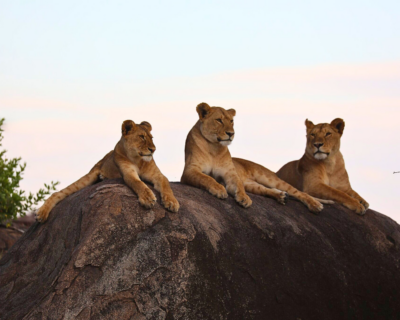
Tanzania is home to the largest wild lion population in the world and the second largest population of elephants. It is a vital stronghold for many endangered species, including Africa’s shrinking population of wild dogs, and boasts rich and diverse ecosystems like savannas, forests, and wetlands. Tanzania’s commitment to conservation is evident in its extensive network of protected areas, while tourism, much of it based on nature, accounts for 18% of GDP and 1.5 million jobs.
In many ways, Tanzania is one of Africa’s conservation success stories.
But maintaining and growing public and policy support for conservation is a constant challenge, especially when it’s perceived as competing with economic development. That’s why this week in Dar es Salaam, we kicked off a communications and awareness campaign with the simple message: conservation is for everybody.
Nature provides vital benefits to every Tanzanian, and the first phase of this new campaign, called “I am a Conservationist”, aims to remind people that no matter who they are or where they come from, they can lend their voice in support of conservation.
The campaign launch event premiered two new videos, featuring prominent Tanzanian singers, TV personalities, and influencers, alongside everyday citizens, each outlining what nature means to them and sharing that they are proud to identify as conservationists.
Singer and TV personality Nakaaya Sumari, popular music duo Navy Kenzo, and Tanzania’s newly appointed head of the World Health Organization Africa region, Professor Mohamed Janabi, all lent their voices in support of nature, reminding us of the deep national and personal bonds we all have to nature and the multitude of positive services it provides — from beauty and inspiration, to jobs and health.
Sumari noted that nature is Tanzania, and that nature is for everyone. She urged everyone to spend a day in nature with their family or friends, appreciating it and reflecting on what it means to them. Other ways of being a conservationist, she suggested, are to not eat unregulated wild meat, to not throw plastic waste where it shouldn’t go, or to think twice before cutting down plants or trees.
“We find inspiration for our songs from nature,” the members of Navy Kenzo shared in the videos. “It is valuable, and as Tanzanians, our cultural identity, national development, and future prospects depend heavily on using nature sustainably, and therefore we must all be conservationists. We are conservationists!”
In partnership with the Community Wildlife Management Areas Consortium (CWMAC) and Honeyguide Foundation, future phases of the campaign will draw attention to the role of local communities in nature conservation and the economic and social benefits of Tanzania’s community-led conservation model.
The overwhelming message is: if you are a Tanzanian, you have a connection to nature and you can play your own role in protecting it. The “I am a Conservationist” initiative aims to foster a sense of shared responsibility and inspire all Tanzanians to identify as conservationists. It is a reminder that conserving our environment benefits our daily lives and wellbeing, as well as those of future generations.
In a coffee shop in Dar es Salaam, waitress Neema Mduma was asked what nature means to her. “Happiness,” she replied.
Stay in touch and get the latest WildAid updates.
SIGN UP
